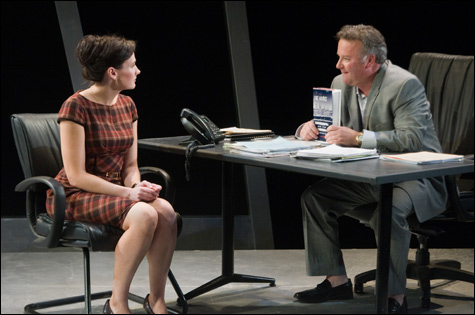
SPEED-THE-PLOW: Robert Pemberton wonders whether Aimee Doherty works with her legs. |
It’s been 21 years since Speed-the-Plow first milked the cravenness of Hollywood and the self-described “whores” who turn its celluloid tricks. But David Mamet’s scathing, staccato comedy has held up at least as well as Madonna, who made her Broadway debut in the original 1988 production. And in Robert Walsh’s jumpy revival for New Repertory Theatre (at the Arsenal Center for the Arts through November 7), greed and testosterone flow from a single spigot. Even without an uncharacteristically mousy Madonna outclassed by her male counterparts, the play’s sole female character remains hard to read: naïve turned idealist or just another power-grubbing denizen of the brothel? Whichever, the struggle she catalyzes in the heretofore amoral breast of film producer Bobby Gould, who’s torn between a formula blockbuster and an alleged art film about radiation and the end of the world, mixes a funny Faust into The Day of the Locust.
Speed-the-Plow, which takes its name from a farmers’ “good luck,” has nothing to do with plowing — at least not in the agricultural sense. Gould is still settling into the office he scored along with his new title as Head of Production for an unnamed movie studio when hanger-on Charlie Fox turns up barely able to contain himself about a new project. It seems he’s scraped a script off the slush pile, optioned it, and tempted a rival-studio megastar to star in what Gould, joining in Fox’s riff, characterizes as “a buddy film, an action film . . . blah, blah, some girl . . . action, blood, a social theme.” Which isn’t a bad description of Speed-the-Plow.
After the two guys get through verbally chest-butting each other, Fox bets his new superior $500 he can’t bed the attractive temp who’s brought them coffee. In the midst of a “courtesy read” of an apocalyptic novel by “an Eastern sissy writer,” Gould lobs the task to the secretary as a means of getting her over to his house later on to deliver a report. When she shows up brimming with enthusiasm and heartfelt if ridiculous quotes from the book, he’s all polite lust-in-waiting until he develops some last-ditch yearning “to do something which is right” — even if that means screwing over his pal and the buddy movie.
The one weakness of Speed-the-Plow — and it certainly doesn’t ruin the play, just makes it puzzling — is that, if Gould is meant to be torn between art and commerce, as well as between sex and success, the end-of-the-world book shouldn’t sound like such a pretentious piece of claptrap. But given that the tome is based on an actual Mamet short story from the ’80s, the playwright may not think it so bad. Certainly Aimee Doherty’s Karen appears in its thrall; Doherty doesn’t fade into the role, but I’d like to have seen some calculating ambition tucked in amid the starry eyes and the cleavage.